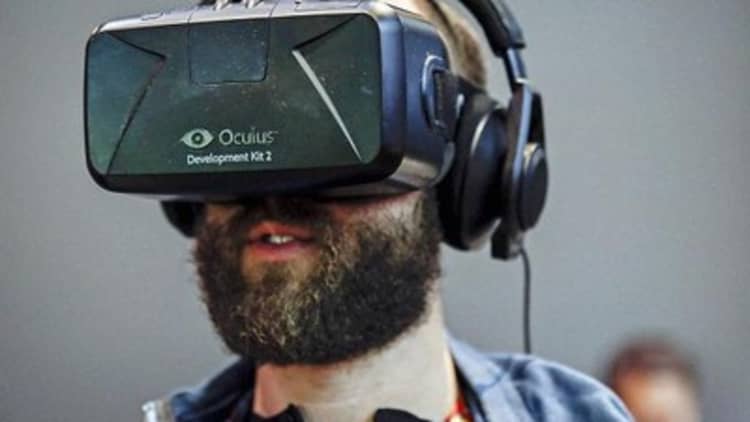Oculus is ready to release its first commercial product.
By year's end, the Facebook-owned virtual reality company and Samsung will actively market the Gear VR headset as a full-fledged consumer device—marking the first time Oculus has made a push for a mass consumer audience. (Previous versions of the Samsung collaboration were offered in very small batches.)
"Oculus is going forward as hard as it can—broad consumer, trying to sell as many products as possible with the next Gear VR," said John Carmack, Oculus' chief technology officer, as part of his keynote address at the ongoing Game Developer Conference in San Francisco.
That's likely to be music to the ears of people who have been eager to experience VR as buzz about the technology has steadily built in the past few years. And the expected timing of the release—late this year, though Carmack didn't give a specific date, noting that was Samsung's decision to make—should give game developers a reasonable amount of time to create launch titles for the system.
Read More Facebook goes down, denies cyberattack
Like the second-generation Gear VR, which was announced earlier this week at the Mobile World Congress, the third-generation product will not be a big shift from the original product, which shipped last December for $199.
"Don't expect anything radically different," said Carmack. "It will essentially be the same thing. … [But] I believe there's going to be a real market where [game development studios] can be successful."

The launch of the initial Gear VR last year sparked an internal debate at Oculus, which was hesitant to publicly release the product. Samsung, upon seeing the device, immediately wanted to commercialize it, but the VR company worried the product's shortcomings would result in consumers having a poor experience, which could kill the momentum of virtual reality.
"There was a lot of tension between Samsung and Oculus about what constitutes the right VR product," said Carmack.
The two ultimately compromised, agreeing to a very limited number of units for the product—and labeling it an "innovator edition" (a trumped up way of calling it a prerelease product).
It sold out almost instantly—and to Oculus' surprise, very few people complained about motion sickness or returned the Gear VR.
"A funny thing happened: People kind of like it," said Carmack. "You can get eye strain. You can make yourself sick if you do certain things. But the response has been a lot better than people expected."
Read More Facebook acquires voice tech start-up Wit.ai
That response brought about a pivot to Oculus' philosophy, leading officials to decide they didn't have to have an absolutely perfect product before it launched.
While Carmack, who led development on the seminal shooters "Doom" and "Quake," is known as a graphical innovator, he said he actually spends virtually all of his time at Oculus working with the mobile version of the product, rather than the more widely anticipated (and buzzed about) high-end PC version.
The reason for that, Carmack said, is he believes the mobile industry will ultimately be where the real growth takes place in VR.
"It's almost a cliché when people talk about serving 1 billion users," he said. "[But] I honestly do see a world with 1 billion people using VR headsets. … In the long run mobile tech is going to be the dominant platform.. … I do firmly believe this is an important direction. And this, literally, was the thing that made me come full time at Oculus—this vision that we could take mobile VR and make it the future."


